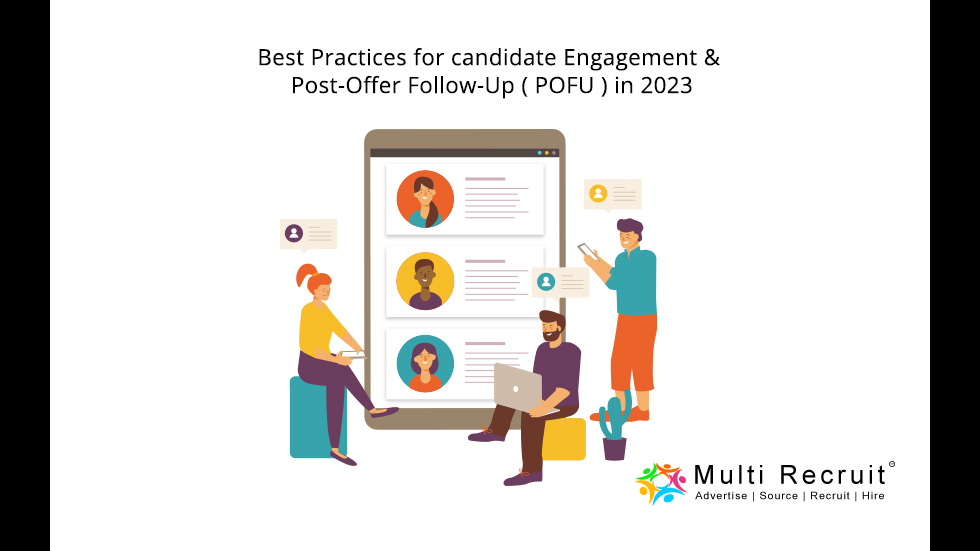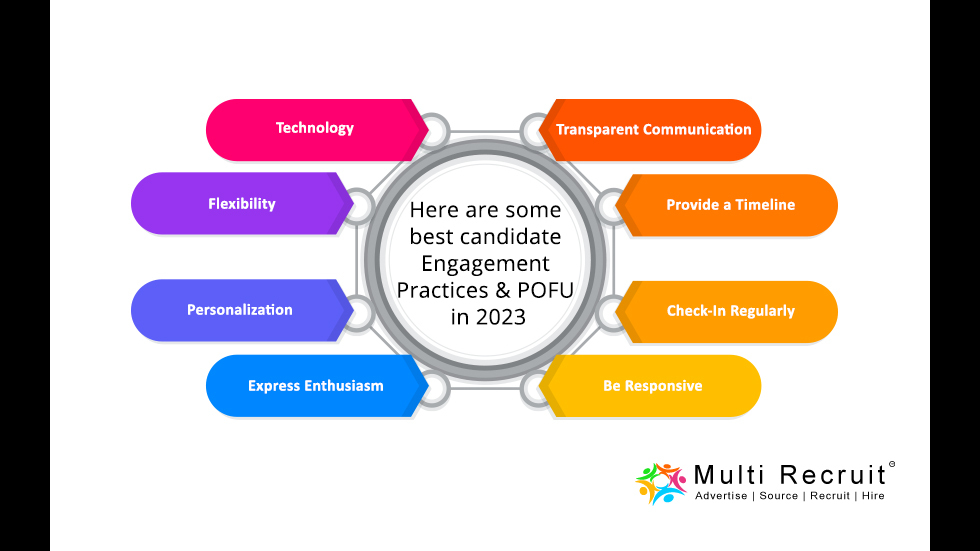As the world continues to change at an ever-increasing pace, so too do the needs and expectations of job seekers. In 2023, candidate engagement will continue to be a crucial factor in attracting and retaining top talent.
In the competitive job market of 2023, it’s more important than ever to ensure your post-offer follow-up is effective and professional. Candidates have more options than ever before and will be evaluating not only the offer itself but also the hiring experience. Here are some best practices to keep in mind when following up with candidates after making a job offer.
Once an offer has been made to a candidate, it’s essential to follow up with them to ensure a smooth transition and to answer any questions they may have. In this blog post, we’ll discuss the importance of post-offer follow-up in recruitment and some best practices to follow in 2023.
Why Candidate Engagement & Post-Offer Follow-Up Is Important?
-
Candidate Experience
Post-offer follow-up is critical to ensuring a positive candidate experience. It’s essential to keep in mind that the candidate may have other offers on the table, and a lack of follow-up or delays in the process could cause them to lose interest or accept another offer. By following up promptly and regularly, you can keep the candidate engaged and excited about the opportunity, ultimately leading to a higher acceptance rate.
-
Clarify concerns & provide adequate Information
Additionally, post-offer follow-up allows you to address any concerns the candidate may have and provide them with additional information they may need. For example, they may have questions about the job duties, salary, benefits, or the company culture. By being responsive and transparent, you can build trust with the candidate and increase the likelihood of them accepting the offer.
Here are some best candidate engagement practices & POFU in 2023:
Transparent Communication
In the era of social media and online reviews, transparency is more important than ever. Job seekers want to know what they are getting into before accepting a job offer, and they expect employers to be upfront and honest about the company culture, job responsibilities, and compensation package. Employers can demonstrate their commitment to transparency by providing detailed job descriptions, offering salary ranges upfront, and sharing reviews and testimonials from current employees. This can help build trust with candidates and encourage them to apply and accept job offers.
When extending the offer, make sure to communicate all the details clearly, including the start date, job duties, salary, and benefits. Avoid any ambiguity or confusion, which could lead to misunderstandings later on.
Provide a Timeline
Provide the candidate with a timeline for when they can expect to receive any necessary paperwork or onboarding materials, as well as when they can expect to hear from you next.
Check-In Regularly
After extending the offer, make sure to check in with the candidate regularly to see if they have any questions or concerns. This will help them feel valued and appreciated and will also give you the opportunity to address any issues that may arise.
Be Responsive
Be responsive to the candidate’s questions and concerns and try to provide timely answers. This will help build trust and confidence in your organization.
Express Enthusiasm
Make sure to express your enthusiasm and excitement about the candidate joining your organization. This will help them feel valued and appreciated and will also help them feel more confident in their decision to accept the offer.
Personalization
One of the most effective ways to engage with candidates is through personalized communication. In 2023, job seekers will expect more than just generic emails and automated messages. Employers who take the time to tailor their messages to each candidate’s unique interests, experience, and career goals will stand out from the competition. This can be achieved using sophisticated applicant tracking systems (ATS) and candidate relationship management (CRM) software. These tools can help recruiters and hiring managers track each candidate’s progress through the hiring process and tailor their communications accordingly.
Flexibility
In 2023, job seekers will continue to value flexibility and work-life balance. Employers who offer remote work options, flexible schedules, and other benefits that promote work-life integration will be more attractive to top talent. To engage with candidates in 2023, employers should be clear about their expectations and policies around remote work and flexible schedules. They should also be open to negotiating these benefits on a case-by-case basis to accommodate each candidate’s unique circumstances.
Technology
In 2023, technology will continue to play a critical role in Post offer Follow up. Employers who embrace the latest HR tech trends, such as chatbots, video interviews, and virtual job fairs, will be better positioned to attract and retain top talent. To engage with candidates through technology, employers should be mindful of the candidate’s experience. They should ensure that their technology tools are user-friendly and accessible and that candidates receive timely and personalized communications throughout the hiring process.
Conclusion
Post-offer follow-up is a crucial step in the recruitment process. By keeping the candidate engaged, addressing their concerns, and being responsive, you can increase the likelihood of them accepting the offer and joining your organization. By focusing on personalization, transparency, flexibility, diversity and inclusion, and technology, employers can create a candidate experience that sets them apart from the competition and attracts top talent to their organizations. Remember to communicate clearly, provide a timeline, check in regularly, be responsive, and express enthusiasm to ensure a positive candidate experience.


